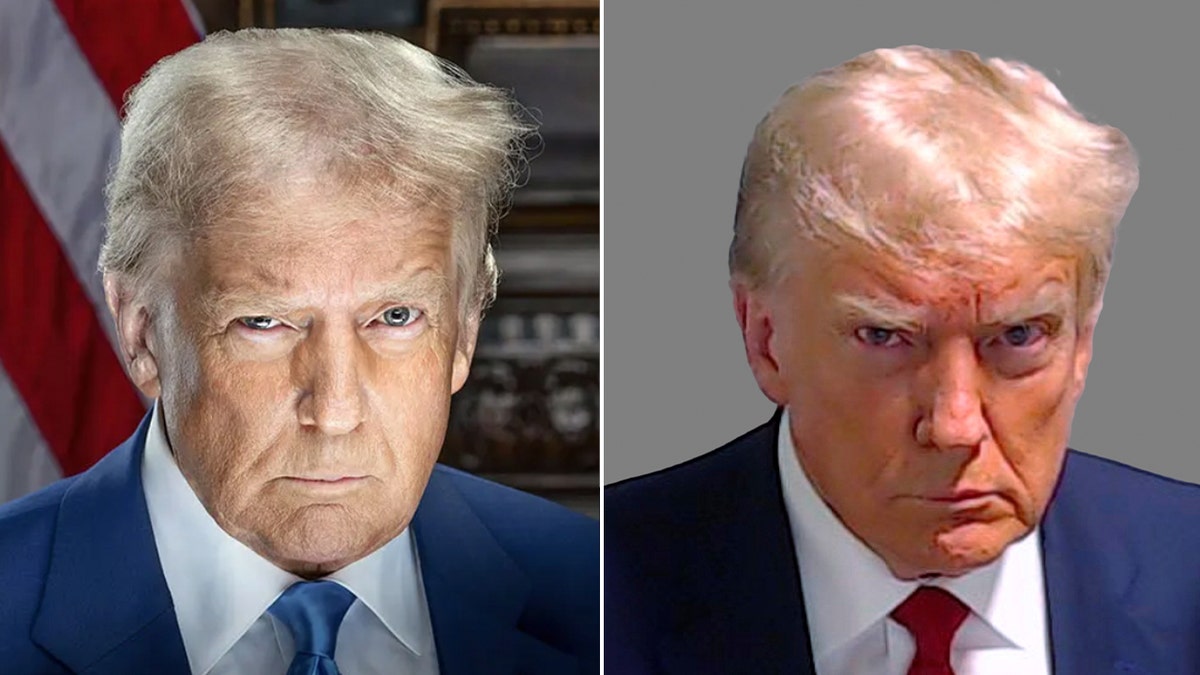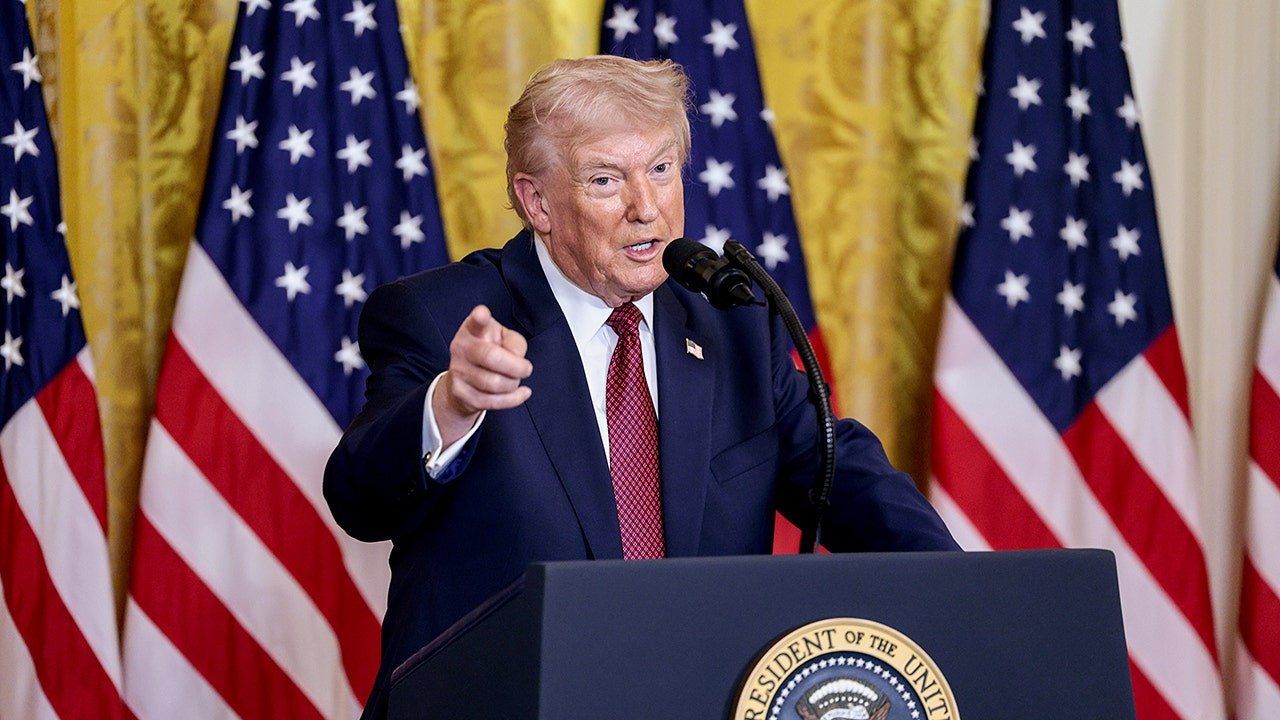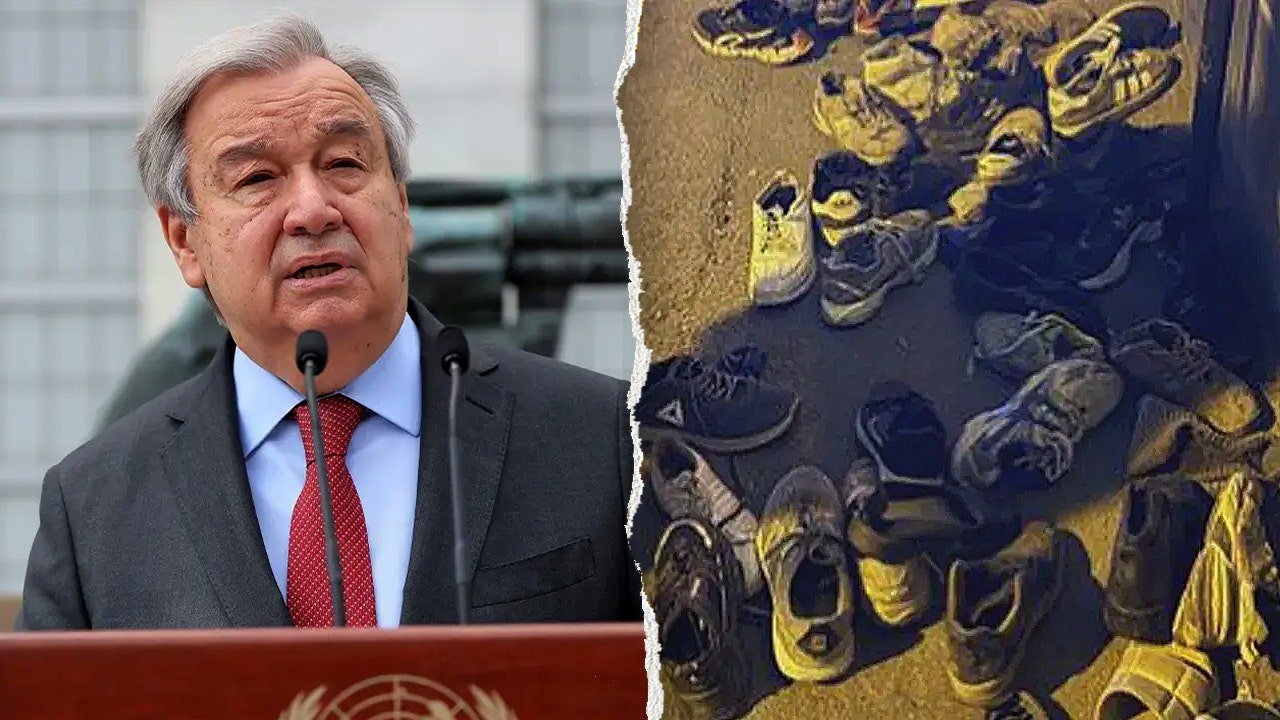INTERNACIONAL
How Donald Trump tried to court the Atlantic – and why the liberal magazine landed an interview

Hell hath frozen over: At the White House the other day, Donald Trump «was launching a charm offensive, directed mainly at Goldberg,» as in Jeffrey Goldberg, the Atlantic’s editor-in-chief. «There was none of the name-calling or hostility he regularly levels at our magazine.»
That’s according to Atlantic reporters Ashley Parker and Michael Scherer, who wrote the magazine’s cover story, which was posted yesterday.
For all the insights gleaned from the interview, nothing is more fascinating than how it came about.
They called the president on his cell phone. (Wha? Who do I have to court to get that? The reporters ain’t saying.)
Trump says he did the initial phone interview to see if the liberal magazine could be fair.
PRESIDENT TRUMP TELLS THE ATLANTIC HE RUNS THE COUNTRY ‘AND THE WORLD’
So I’m here to pronounce that the entire, seemingly endless piece is fair. The president hasn’t taken a shot at it on Truth Social, at least so far.
He has, however, ripped new polls from the «Failing New York Times» and «ABC/Washington Post» as «FAKE POLLS FROM FAKE NEWS ORGANIZATIONS,» saying they should be «investigated for ELECTION FRAUD, and add in the Fox News Pollster while you’re at it.» His lowest approval rating, in the Post-ABC survey, was 39 percent.
Meanwhile, we may now look back on Trump’s 2024 victory as inevitable, but after Jan. 6 it was anything but. On the cell call, «The president seemed exhilarated by everything he had managed to do in the first two months of his second term.»
President Trump recently gave an interview to The Atlantic. (BRENDAN SMIALOWSKI/AFP via Getty Images)
And then came the transaction: «As ever, Trump was on the hunt for a deal. If he liked the story we wrote, he said, he might even speak with us again.»
Goldberg describes the session: «What I found in this particular meeting was a Trump who was low-key, attentive, and eager to convince us that he is good at his job and good for the country. It isn’t easy to escape the tractor beam of his charisma, but somehow we managed, and we asked him what needed to be asked.
«But squaring Trump the Charmer with the Orcish Trump we more frequently see is difficult…Trump posted on the social-media platform he owns that Ashley is a ‘Radical Left Lunatic’ (she is not) and that Michael ‘has never written a fair story about me, only negative, and virtually always LIES’ (also false). It is our task at the Atlantic not to be bullied by these sorts of attacks.»
STATE OF WAR: HOW TRUMP IS FIGHTING A 9-FRONT BATTLE
The most interesting Trump sound bite is his comparison of the two terms:
«The first time, I had two things to do—run the country and survive; I had all these crooked guys. And the second time, I run the country and the world.»
Parker and Scherer did many other interviews, such as with Steve Bannon. «Our reality is that we won,» and he cited the conspiracy theory that the FBI had incited the crowd on Jan. 6. The reporters said that was simply untrue.
«Now, here’s the interesting thing,» Bannon said. «Who’s won that argument? I think we have…
«This time it’s ‘Hey, f**k you, Greenland’s ours…When you’ve come back from such long odds, you clearly feel, ‘I can do anything.’ »
What about the four criminal investigations, including the conviction on the weakest one – Alvin Bragg’s hush money case? Trump says his numbers kept going up.
INTERVIEWING DONALD TRUMP: A LAST-MINUTE BLITZ AND NEW CLOSING MESSAGE
«Shockingly, yes,» Trump said. «Normally, it would knock you out. You wouldn’t even live for the next day. You know, you’d announce your resignation, and you’d go back and ‘fight for your name,’ like everybody says—you know, ‘fight for your name, go back to your family.’ …Yeah, it made me stronger, made me a lot stronger.»
He also said in the phone interview: «I got indicted five different times by five different scumbags, and they’re all looking for jobs now, so it’s one of those things. Who would have thought, right? It’s been pretty amazing.»
After the 2016 election, Trump told oil executives at Mar-a-Lago:
If I’m not president, you’re f***ed. Look at your profit-and-loss statements. You realize what would have happened to you if she was president? What’s wrong with you?») She was Kamala Harris, of course.

Referring to the criminal cases against him – including the charges brought forth by Manhattan District Attorney Alvin Bragg, Trump said «it made [him] stronger.» (Fulton County Sheriff’s Office via AP / Trump-Vance Transition Team)
One turning point: When he went to East Palestine, Ohio after the derailment of a train carrying toxic chemicals, while Joe Biden didn’t do squat.
On the Kennedy Center: «I didn’t really get to go the first time, because I was always getting impeached or some bulls**t, and I could never enjoy a show.» So he fired the Democrats and made himself chairman.
All right, enough quotes. Wait, one more that captures the tone of the piece:
«I got 38 percent of the male Black vote. Nobody knew that was possible. That’s a lot. I got 56 percent of Hispanics. How about that one? Every county along the Texas border is Hispanic. I won every one of them.» Though every single number he cited was wrong, the general thrust of his observation was correct.»
The reporters chronicled how things have gone south for the president, especially on tariffs and the economy, and how he pressured Hill Republicans into backing his nominees with primary threats.
SUBSCRIBE TO HOWIE’S MEDIA BUZZMETER PODCAST, A RIFF ON THE DAY’S HOTTEST STORIES
After the March phone interview, the reporters tried Trump’s cellphone again. Just got voice mail. But at 1:38 am, he tried them back. No message.
Trump believes he can win over even his worst enemies. In 2015 or 2016, I watched him make a beeline in the New York green room for Karl Rove, who was very rough on him. At worst, he thinks, he can neutralize the person. Or soften him or her up for the next time. He enjoys the challenge.
The mainstream media almost uniformly can’t stand Donald Trump. He does invite some of his own negative headlines, while providing unprecedented access, but much of the press is back in Resistance mode.
CLICK HERE TO GET THE FOX NEWS APP
Still, the Atlantic’s original pitch is undeniable, that he’s «The Most Consequential President of the 21st Century.»
Media Buzz,Donald Trump,Media
INTERNACIONAL
Los abusos de los agentes de inmigración en Estados Unidos: corrupción, agresiones y abusos sexuales

Los investigadores dijeron que un agente de control de inmigración se salió con la suya al agredir físicamente a su novia durante años. Otro admitió que abusó sexualmente de una mujer bajo su custodia en repetidas ocasiones. Un tercero está acusado de aceptar sobornos para eliminar órdenes de detención sobre personas susceptibles de deportación.
Al menos dos docenas de empleados y contratistas del Servicio de Inmigración y Control de Aduanas de Estados Unidos (ICE, por sus siglas en inglés) han sido acusados de delitos desde 2020, y sus infracciones incluyen patrones de abuso físico y sexual, corrupción y otros abusos de autoridad, según una revisión realizada por The Associated Press.
Aunque la mayoría de los casos ocurrieron antes de que el Congreso votara el año pasado para otorgar al ICE 75.000 millones de dólares para contratar más agentes y detener a más personas, los expertos dicen que este tipo de delitos podría acelerarse dado el gran volumen de nuevos empleados y los poderes que se les han otorgado para usar tácticas agresivas en la detención y deportación de personas.
El gobierno de Trump ha envalentonado a los agentes al argumentar que tienen «inmunidad absoluta» por sus acciones en servicio y debilitar la supervisión. Un juez sugirió recientemente que el ICE estaba desarrollando una preocupante cultura de ilegalidad, mientras que los expertos han cuestionado si los nuevos empleados están recibiendo suficiente evaluación y capacitación.
“Una vez que una persona es contratada, incluida, pasa por la capacitación y no es la persona adecuada, es difícil deshacerse de ella y todos pagaremos un precio más adelante”, afirmó Gil Kerlikowske, quien sirvió como comisionado de Aduanas y Protección Fronteriza de Estados Unidos de 2014 a 2017.
Casi todas las agencias de seguridad lidian con malos empleados, y los delitos relacionados con la violencia doméstica y el abuso de sustancias son problemas arraigados en el sector. Pero el rápido crecimiento del ICE y su misión de deportar a millones de personas no tienen precedentes, y el análisis de AP encontró que el inmenso poder que los agentes ejercen sobre poblaciones vulnerables puede llevar a abusos.
La subsecretaria del Departamento de Seguridad Nacional, Tricia McLaughlin, dijo que la mala conducta no era generalizada en la agencia y que el ICE «se toma muy en serio las acusaciones de mala conducta por parte de sus empleados». Afirmó que la mayoría de los nuevos contratados ya habían trabajado para otras agencias de seguridad y que sus antecedentes fueron minuciosamente evaluados.
«Estados Unidos puede estar orgulloso del profesionalismo que nuestros agentes aportan al trabajo día tras día», expresó.
El ICE anunció el mes pasado que había más que duplicado su tamaño a 22.000 empleados en menos de un año.
Kerlikowske dijo que los agentes del ICE son particularmente «vulnerables a problemas de uso innecesario de la fuerza», dado que a menudo realizan operaciones en público mientras enfrentan protestas. El número de detenidos del ICE casi se ha duplicado desde el año pasado, a 70.000 personas, y los empleados y contratistas responsables de supervisarlos también enfrentan condiciones complicadas que pueden proporcionar más oportunidades para la mala conducta.
La Patrulla Fronteriza duplicó su tamaño a más de 20.000 agentes de 2004 a 2011, seis años más de lo que le tomó al ICE. La agencia se vio avergonzada por una ola de corrupción, abuso y otras infracciones por parte de algunos de los nuevos empleados. Kerlikowske recordó casos de agentes que aceptaron sobornos para permitir que autos que transportaban drogas ingresaran a Estados Unidos o que se involucraron en el tráfico de personas.
Él y otros dicen que el ICE está en posición de ver problemas similares que probablemente serán más amplios en alcance, con menos supervisión y rendición de cuentas.
«La corrupción, el abuso y la mala conducta estaban en gran medida confinados en la instancia anterior a lo largo de la frontera y las interacciones con inmigrantes y residentes de estados fronterizos. Con el ICE, esto se convertirá en un fenómeno a nivel nacional a medida que atraen a muchas personas que se sienten atraídas por esta misión», dijo David Bier, director de estudios de inmigración en el Instituto Cato, un grupo de expertos libertario.
Bier, quien ha ayudado a publicitar algunos de los arrestos recientes y otras presuntas malas prácticas de agentes del ICE, dijo que le ha sorprendido la «notable variedad de diferentes delitos y cargos que hemos visto».
El análisis de AP examinó registros públicos que involucran casos de empleados y contratistas del ICE que han sido arrestados desde 2020, incluidos al menos 17 que han sido condenados y otros seis que están esperando juicio. Nueve han sido acusados en el último año, incluido un agente procesado el mes pasado por agredir a un manifestante cerca de Chicago cuando estaba fuera de servicio.
Algunos de los delitos más graves fueron cometidos por empleados veteranos de ICE y supervisores en lugar de novatos.
Mientras que los funcionarios federales han justificado la agresión de ICE, el comportamiento de los agentes está atrayendo el escrutinio de observadores con celulares y fiscales en jurisdicciones lideradas por demócratas. Las agencias locales están investigando los tiroteos fatales del mes pasado en Minneapolis de los manifestantes Renee Good y Alex Pretti por parte agentes federales, así como el asesinato de Keith Porter por un agente de ICE fuera de servicio en Los Ángeles en la víspera de Año Nuevo.
En todo el país, los casos han atraído titulares no deseados para el ICE, que ha gastado millones de dólares publicitando los antecedentes penales de aquellos que arrestan como los «peores de los peores».
INTERNACIONAL
Trump directs military to strike new deals with coal-fired power plants: ‘Going to be buying a lot of coal’

NEWYou can now listen to Fox News articles!
President Donald Trump signed an executive order Wednesday directing the Department of War (DOW) to work directly with coal-fired power plants on new long-term power purchasing agreements, arguing the move would ensure «more reliable power and stronger and more resilient grid power.»
«That’s why I’m also pleased to announce that, in just a moment, I will sign an executive order that directs the Department of War to work directly with coal plants on the new power purchasing agreements, ensuring that we have more reliable power and stronger and more resilient grid power,» Trump said.
«And we’re going to be buying a lot of coal through the military now, and it’s going to be less expensive and actually much more effective than what we have been using for many, many years.»
The executive order, «Strengthening United States National Defense with America’s Beautiful Clean Coal Power Generation Fleet,» states, «The United States must ensure that our electric grid … remains resilient and reliable, and not reliant on intermittent energy sources,» calling the grid «the foundation of our national defense as well as our economic stability.»
TRUMP ADMIN TO REPEAL OBAMA-ERA GREENHOUSE GAS FINDING IN LARGE-SCALE DEREGULATION
Secretary of the Interior Doug Burgum, left; House Speaker Mike Johnson; and EPA Administrator Lee Zeldin watch as President Donald Trump signs an executive order directing the military to purchase electricity from coal-fired power plants during a «Champion of Coal» event Wednesday at the White House in Washington, D.C. (Saul Loeb/AFP via Getty Images)
It adds, «It is the policy of the United States that coal is essential to our national and economic security.»
Under a section titled «Power Purchase Agreements with Federal Installations,» the order states that the Secretary of War, «in coordination with the Secretary of Energy, shall seek to procure power from the United States coal generation fleet by approving long-term Power Purchase Agreements … with coal-fired energy production facilities to serve DOW installations or other mission-critical facilities.»
Speaking at the White House and flanked by members of his Cabinet, coal workers and GOP lawmakers, Trump framed coal as vital to defense and industrial production.
BIDEN’S GREEN ENERGY FIASCO, NOT TRUMP’S REFORMS, IS JACKING UP YOUR ELECTRIC BILL

President Donald Trump speaks during a «Champion of Coal» event in the East Room of the White House Wednesday, in Washington, D.C. (Shawn Thew/EPA/Bloomberg via Getty Images)
«Coal is also critical to our national security,» he said. «Vital to everything from steel production to shipbuilding and artificial intelligence.»
He also pointed to winter storms as evidence of coal’s reliability.
«More than 200 million Americans across 35 states were impacted by the storm, and the only reason most were able to take a hot shower was thanks to the power provided by the most reliable, dependable of, and really dependable form of energy that we have,» Trump said. «And that’s clean, beautiful coal.»
Trump contrasted his approach with the prior administration.
«On day one of this administration, I ended the war on coal,» Trump said. «We terminated the green new scam, and we withdrew from the unfair, one-sided Paris climate accord.»
He also criticized wind energy.
TRUMP TO HOST ‘CLEAN BEAUTIFUL COAL’ EVENT, CALLS IT AMERICA’S MOST RELIABLE ENERGY

President Donald Trump speaks during a «Champion of Coal» event, where he ordered the Pentagon to purchase electricity from plants and announced millions of dollars to upgrade existing sites. (Graeme Sloan/Bloomberg via Getty Images)
«I’m not a big fan of those crazy windmills that are all made in China,» Trump said. «You know, they’re made in China but not used by China.»
Trump said the Tennessee Valley Authority was «taking action to save two major coal plants,» mentioning the Cumberland Fossil Plant and the Kingston Fossil Plant.
«These two plants were slated for termination,» Trump said, «but we’re going to save over 450 jobs by keeping them going and going strong.»
Trump said he was «directing the Department of Energy to issue funds» to coal plants in several states.
«In addition, I’m directing the Department of Energy to issue funds to coal plants in West Virginia, Ohio, North Carolina and Kentucky to keep them online and keep those plants open,» Trump said.
On permitting, Trump said, «In one year of Trump, we’ve already approved over 70 permits for very big, very powerful mines that are going to be with us for many, many years to come.»
Trump said coal production and generation had increased during his tenure.
«Since I took office, coal production is up by nearly 4 million tons a month after falling for decades,» he said. «Coal power generation is up by nearly 15% in my first year.»
Later in the event, Peabody Energy CEO Jim Grech presented Trump with an award.
«Sir. Just to show our appreciation,» Grech said. «The trophy says the undisputed champion of beautiful, clean coal.»
Trump closed by returning to what he described as American energy dominance.
CLICK HERE TO DOWNLOAD THE FOX NEWS APP
«America is now the No. 1 energy producer in the world,» he said. «We are by far No. 1.»
The Department of War did not immediately respond to Fox News Digital’s request for comment.
donald trump,energy,military,defense,politics
INTERNACIONAL
UN chief blasted as ‘abjectly tone-deaf’ over message to Iran marking revolution anniversary

Trump, Netanyahu meet at White House amid Iran talks
Fox News’ Peter Doocy reports the latest on President Donald Trump’s meeting with Israeli Prime Minister Benjamin Netanyahu. Discussions cover Iran nuclear negotiations and the future ‘Board of Peace’ for Gaza.
NEWYou can now listen to Fox News articles!
UNITED NATIONS: U.N. Secretary-General António Guterres sent a congratulatory message to Iran marking the anniversary of the 1979 Islamic revolution, a move that drew sharp criticism from anti-regime Iranian voices and human rights advocates.
In a letter addressed to Iranian President Masoud Pezeshkian, Guterres «extended his warmest congratulations on the National Day of the Islamic Republic of Iran,» describing such anniversaries as an opportunity to reflect on a country’s path and contributions to the international community, according to Iranian state and regional reporting published Wednesday.
The message comes weeks after the U.N.’s top human rights body condemned Iran over abuses tied to a violent crackdown on anti-government protests and mandated further investigation into alleged violations, with some reports citing casualty figures that could reach 30,000, pending verification.
RUBIO REVOKES IRANIAN OFFICIALS’ US TRAVEL PRIVILEGES OVER DEADLY PROTEST CRACKDOWN KILLING THOUSANDS
U.N. Secretary-General António Guterres speaks at the 55th session of the Human Rights Council in Geneva, Switzerland, on Feb. 26, 2024. (Salvatore Di Nolfi/Keystone via AP)
Furthermore, according to the NGO U.N. Watch, Iran’s foreign minister, Abbas Araghchi, is expected to address the U.N. Human Rights Council on Feb. 23.
Against that backdrop, critics said the secretary-general’s congratulatory message risked sending a conflicting signal.
«The U.N. secretary-general’s congratulatory message is not merely diplomatic routine — it is abjectly tone-deaf,» said Iran analyst Banafsheh Zand. «At a time when the Iranian people continue to endure executions, repression and systemic abuse at the hands of the Islamic Republic, offering formal congratulations to the architects of that suffering reads as a moral failure.»
Zand added that such gestures «erode [the U.N.’s] credibility and deepen the wound for those still fighting for freedom inside Iran.»
Andrew Ghalili, policy director at the National Union for Democracy in Iran (NUFDI), said the message amounted to legitimizing a repressive system.
AMBASSADOR MIKE WALTZ LAYS OUT ‘AMERICA FIRST’ VISION FOR US LEADERSHIP AT THE UN

Cars burn in a street during a protest over the collapse of the currency’s value in Tehran, Iran, Jan. 8, 2026. (Stringer/WANA (West Asia News Agency) via Reuters)
«The United Nations is legitimizing a regime built on repression, executions and the systematic destruction of basic freedoms,» Ghalili said. «Offering celebratory recognition to the Islamic Republic on the anniversary of its revolution ignores the bloodshed, the repression of protesters and the ongoing hostage-taking of innocent people.»
Human rights groups have repeatedly warned that impunity has enabled ongoing abuses in Iran, urging U.N. member states to pursue accountability for what they describe as systemic violations and mass killings of protesters.
Stéphane Dujarric, spokesperson for the secretary-general, told Fox News Digital during a press briefing that the message to Tehran was part of a long-standing U.N. protocol.
IRAN’S TOP DIPLOMAT SAYS NATION’S POWER LIES IN DEFYING PRESSURE: ‘NO TO THE GREAT POWERS’

Iranian Foreign Minister Abbas Araghchi holds a joint press conference with Turkish Foreign Minister Hakan Fidan in Istanbul, Turkey, on Jan. 30, 2026. (Arif Hudaverdi Yaman/Anadolu via Getty Images)
«The letter that came out from the secretary-general is a standard letter. Every year, each member state gets the exact same letter… congratulating them on the national holiday and conveying best wishes to the people of that country.»
The spokesperson added that similar letters were sent the same day to other countries marking national holidays and «should not be interpreted… as an endorsement of whatever policies may be put in place by the government.» He said the message «doesn’t change the secretary-general’s view» on Iran, noting Guterres has previously spoken out against the crackdown and violence.
On reports that Iran’s foreign minister is expected to address the Human Rights Council later this month, the spokesperson said the matter falls under the council’s authority.
CLICK HERE TO DOWNLOAD THE FOX NEWS APP
«That’s a decision of the Human Rights Council,» he said. «This is a membership organization. Every member state has a right to address legislative bodies… It’s not within the secretariat’s authority to bar member states from addressing a legislative body.»
united nations,secretary general,iran,world protests

 POLITICA2 días ago
POLITICA2 días agoAcuartelamiento policial en Santa Fe: reclamo salarial y temor a un conflicto nacional de seguridad

 ECONOMIA2 días ago
ECONOMIA2 días agoCuánto le cuesta a la clase media llenar el changuito y cómo varían los precios de los alimentos entre provincias

 POLITICA1 día ago
POLITICA1 día agoLa advertencia de ATE a los gobernadores que apoyan la reforma laboral: “Firmarán su sentencia de muerte”























